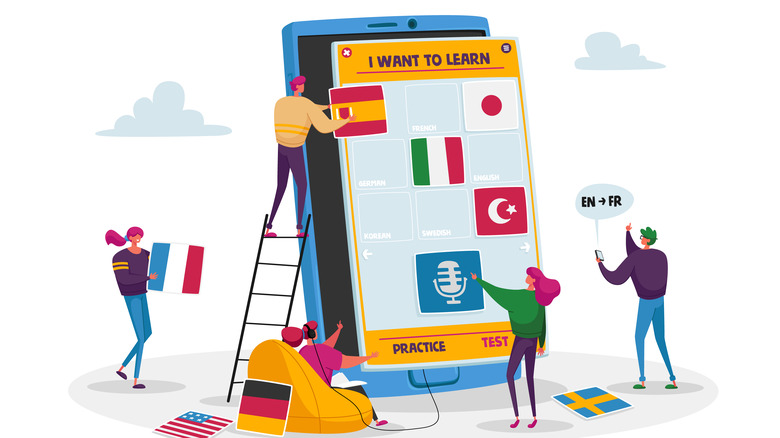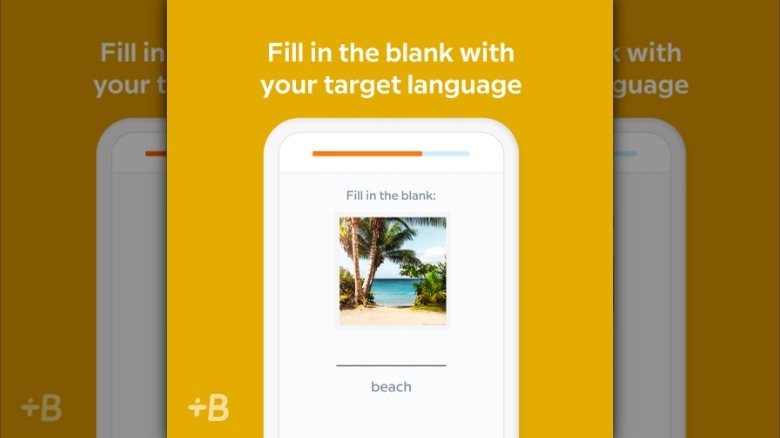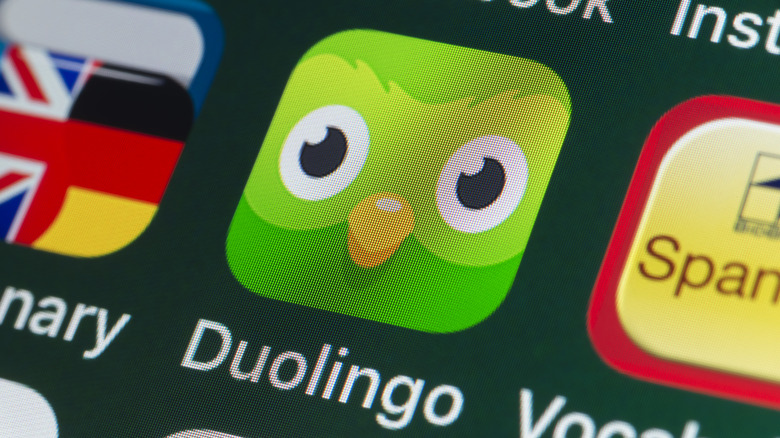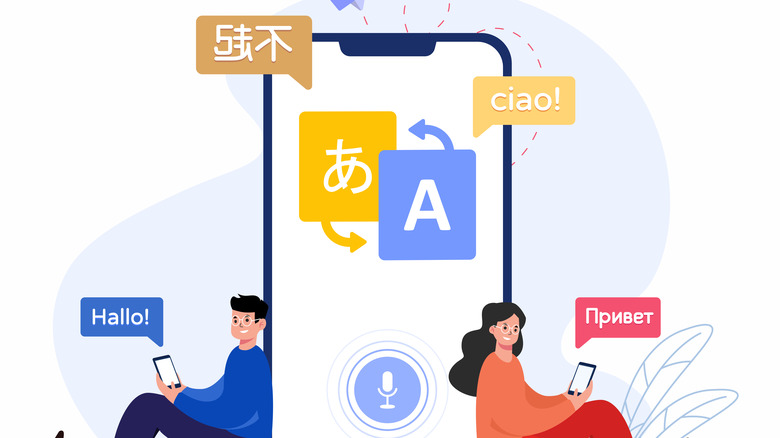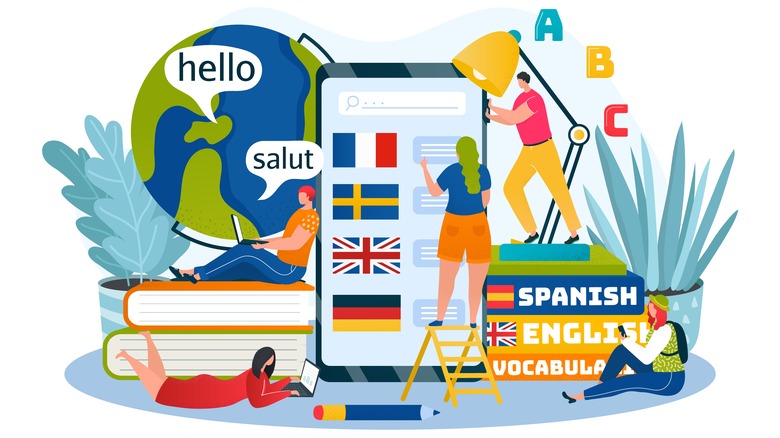Babbel Vs. Duolingo: Which Language App Is Right For You?
There's no getting around it: Learning a new language is hard. Whether we faltered while trying to master the subjunctive in our high school Spanish class or couldn't quite grasp the tonal nuances of Mandarin before a trip to China, the challenge of picking up a new tongue is a universal experience for those who cares to. As anyone who's achieved a degree of fluency in a foreign language will tell you, it requires persistence, dedication, and a healthy sense of humor, but it's not impossible. In fact, with today's technology, it's easier than ever.
When it comes to language learning, Babbel and Duolingo are two of the biggest names in the industry. These apps have made foreign languages more accessible, and many would say downright fun. Given their popularity, a common question among aspiring polyglots and casual learners alike is — which app will best help me meet my goals? While you could use both apps to take advantage of their strengths and weaknesses, that could become overwhelming and probably isn't the best use of your time. Ultimately, the choice between Babbel and Duolingo depends on your personal objectives and preferred learning style.
What is Babbel?
Babbel is for serious language students and provides a structured approach to language acquisition with core lessons that range from 10 to 15 minutes each. Classes consist of listening and repeating words and phrases, digital flashcard drills, and learning grammar points and how to conjugate verbs. You can take a placement test to determine your level in your target language or just jump right in where you see fit.
The nice thing is Babbel doesn't lock you into a rigid learning path. Instead, you can tailor your journey to suit your needs and interests. Once you've selected a course, you'll move through about ten lessons based on some type of scenario, like shopping or going to the doctor. Grammar and natural language usage are big parts of learning with Babbel, which can help users build a strong foundation in any language they choose to study with the app, making it especially useful for learners who want to achieve a high level of proficiency in a language.
What is Duolingo?
"Interactive" and "engaging" are a couple of words that come to mind when people think of Duolingo. The app's unique game-like approach makes learning a language less intimidating than other methods. As you progress through lessons in Duolingo, you'll earn experience points (XP) and gems or "lingots" (a play on the word ingots), Duolingo's digital currency. XP is a way to keep track of progress, and you can spend your lingots on things in the Duolingo store. Duolingo's classes are short and sweet, lasting anywhere from five to ten minutes with a balance of listening, speaking, reading, and short writing exercises.
You'll spend most of your time translating and memorizing new sentences, which often requires you to fill in the blanks or complete multiple-choice questions. The app also offers stories in Spanish, Portuguese, French, German, Italian, and Japanese with exercises that focus on reading and listening comprehension. Users can also set a streak goal, and as you log in day after day (without any breaks), your streak gets longer, and the app celebrates your progress. At the end of the year, you can check out your Duolingo Year in Review to see how well you've done.
Although Duolingo has moved away from the crowdsourcing and volunteer model in recent years, one of the biggest of the app's biggest drawbacks is some of the strange sentences it teaches, which are often far from what a language learner would use in real life. However, Duolingo claims there's a method behind the madness, and its funny sentences can help you learn.
Pricing: Babbel vs. Duoliguo
When it comes to pricing, there's a world of difference between Babbel and Duolingo. You have to pay to play when it comes to Babbel, which operates on a subscription-based model. A 6-month subscription costs $13.45 per month, a 12-month subscription costs $8.95 per month, and for those who never plan to stop learning languages, a lifetime subscription comes in at $349 per month. If you keep an eye out, you can often find specials, with a lifetime subscription going for as low as $199.99. Interestingly enough, if you sign up through the mobile app, the prices are a bit cheaper, with the 12-month plan costing $7.50 per month and the 6-month plan going for $11.16 per month. Learning with Babbel isn't cheap, but considering all of its features, you may just find it worth the money, depending on your goals.
One of Duolingo's biggest appeals is its price — it's free. You'll have to endure ads to access the free version, but you get access to all of the content without paying anything. One of the downsides is a lack of continuity with the free version of the app if you run out of hearts (demerits for mistakes) and have to wait for them to fill back up. However, if you're a casual user who only plans to study in short bursts, this may not be a problem. If you don't mind spending a few bucks, you can subscribe to Super Duolingo for 12.99 per month or $7.99 a month for the one-year plan. Like Babbel, Duolingo often discounts these prices.
Language learning experience
You can use Babbel to learn 14 languages, including Spanish, Russian, Indonesian, and Turkish. These courses are designed by teachers and linguists and tailored to your native language and proficiency level. As you progress through the lessons, the app provides comprehensive grammar explanations to help you get a grasp of your target language's structure. You won't have to rely on rote memorization to learn verb conjugations or different grammar rules; instead, you'll learn about grammar as you complete the exercises. This method is ideal if your goal is to have an in-depth understanding of how your target language works.
However, Babbel may be too much if years of grammar drills in high school and college language classes have left you dreading the thought of picking up a new language. In contrast, Duolingo barely touches upon grammar, instead emphasizing an intuitive approach to language learning. In theory, grammar is built into the exercises you complete on the app, whether that's putting word tiles in the correct order to form a sentence or reading stories. In practice, this method makes it difficult to internalize the structure of a language, and if you want to go deeper, you'll need to supplement Duolingo with a grammar text. As far as the course length and structure, Babbel takes a detailed and systematic approach to teaching languages, allowing learners to take a deep dive into their target language. On the other hand, Duolingo's lessons are shorter and less structured, making them ideal for casual learners or as a supplement to other study methods.
Which app is right for you?
Before choosing one of these apps, it's important to get clear about your language learning goals. Babbel will probably be your best option if you want to achieve a high level of fluency in a language. With Babbel, you'll be able to go beyond the surface of your target language to really get an idea of how it works. Its structured classes don't overwhelm you with grammar points, but they make sure you learn it as you go along, with explanations and tips sprinkled throughout the lessons. The app also helps you develop your speaking skills through verbal exercises that go beyond the listen-and-repeat method Duolingo often uses. You can think of Babbel as a digital textbook in app form. However, like any textbook, it can get dry. You'll need to be self-motivated to keep going because, unlike Duolingo, Babbel doesn't use gamification in the same way to keep you hooked.
Duolingo is probably the best option if you enjoy dabbling in several languages at a time and don't plan to commit a significant amount of time to your language-learning pursuits. You can use the app to learn 45 languages, including fictional languages like High Valyrian and Klingon. While you won't go as deep into languages as you would on Babbel, you can get a solid foundation in a new language if you're consistent about completing the lessons. With leaderboards, the ability to follow friends and constant rewards, it's also a lot easier to stay motivated with Duolingo than Babbel; some would go so far as to say Duolingo is downright addictive. If you find language learning intimidating, Duolingo can help you ease into it by making it fun and interactive.
